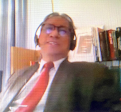 Course Description
Course Description
In this graduate class in political science, we will explore the concepts, perspectives, and possibilities of progressive change in this geographical region called “The Middle East”. By concepts I mean the phenomenological constructs such as “wars”, “revolutions”, “regional, inter-state, and intertribal conflicts”, “spread of Americanization”, and “interventions by other superpowers”, “ resurgence of Islamic fundamentalism” and “the impact of globalization and communications revolution” that have characterized the nature of the region.
We will explore the issue of state sovereignty vis-à-vis shifts in global and geo-politics. We will utilize the tools of global cultural analysis – issue of power, control of resources, ideology, knowledge/power, and discourse of modernity and postmodernity in looking at the complexity of the region. Our approach will be transdisciplinary and kaleidoscopic but not far from looking at the primacy of the human self as the "maker of history"
Along the way, we will learn the skills of analyzing the region, specifically appplying the tools of political-cultural analyis foundationed upon the study of totalitarianism. In our explorations, we will bring our biases and prejudices, and what we hold as "objective view" of the issues -- we will examine analyze these too and construct newer understanding of the themes of inquiry.
At the end of the course we will hopefully have achieved the following:
1)Introduced to the issues, forces, and institutions of the Middle East 2) Explored history the region from the perspective of the interplay between technology and culture.
3) Analyzed the source of change and conflicts that have characterized the region historically and that continue to shape the character of future changes.
4) Analyzed both from the point of view of country study as well as from the thematic and transnational perspectives the changes and continuities in the region.
5) Engaged in critical discussions of the issues, forces, and institutions that impact the region.
6) Discerned similar patterns of conflict in international relations.
7) Produced scholarly writings that address a major phenomenological construct set forth at the beginning of the course, using tools of cultural analysis learned.
We will read primary texts to arrive at a basic understanding of the region; texts such as speeches, declarations, resolutions, etc.
Supporting Online Sources
http://www.columbia.edu/cu/lweb/indiv/mideast/cuvlm/region.html (Area Studies Resource)
http://www.columbia.edu/cu/lweb/indiv/mideast/cuvlm/ (Resource Page from Columbia University)
http://meria.idc.ac.il/research-g/research_guides.html
http://meria.idc.ac.il/us-policy/policy.htm
http://meria.idc.ac.il/books/free-books.html
http://www.columbia.edu/cu/lweb/indiv/mideast/cuvlm/Graphics.html (Images)
http://www.zmag.org/meastwatch/photos.cfm (Photos from Z-NET)
http://www.globalpolicy.org/empire/empireindex.htm (On Empire)
http://first.sipri.org/ (database)
http://www.9-11commission.gov/staff_statements/index.htm (Terrorism)
http://english.aljazeera.net/NR/exeres/967715B8-276C-4708-AC08-7FD102E13BA7.htm (Arab Reform)
http://www.globalisationguide.org/sb01.html (On Globalization)
Supporting Online Audio-Video Sources
http://english.aljazeera.net/HomePage (Al Jazeera)
http://english.aljazeera.net/NR/exeres/54C8AFC7-8C97-4C4F-B38D-D41E6169C42E.htm
http://news.bbc.co.uk/2/hi/middle_east/default.stm (BBC News)


